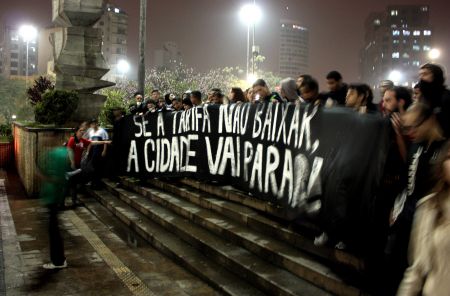Popular uprisings shook Turkey, Brazil, Egypt and Bulgaria, as mass movements against authoritarianism and neoliberalism took to the streets.
In Turkey, police violence against a small protest to save Istanbul's Gezi Park at the end of May set off a massive wave of sympathetic revolts across the country. There have been marches and occupations in over 65 cities, including the on-going occupation of Taksim Square in Istanbul by upwards of 10,000 people, where forums and workshops are held regularly bringing together plural dissident groups. Police response across the country has included tear gas, water cannons and lethal force, with five people reported dead in mainstream news, and as many as 6,000 injured, 10 of whom have had their eyes shot out according to local journalists.
People throughout Brazil turned out first to demand free transit fares, then to contest austerity and government spending on mega-sporting events like the World Cup and the Olympics. Protests quickly spread to more than 80 cities, with more than two million people participating nationwide. In an attempt to boost her plummeting approval ratings, President Dilma Rousseff proposed a constituent assembly, which would lead to the refoundation of the nation's political system, and then took back the proposal the following day. Military police fired rubber bullets and tear gas in attempts to disperse demonstrators and keep them away from the Confederation Cup in Rio, held in the run-up to the 2014 World Cup.
In Egypt, at least 200,000 people participated in a demonstration against the government in Tahrir Square. Four protesters were killed by police, and over 200 injured. “We are fighting more than economic exploitation, naked police violence or an illegitimate legal system. It is not rights or reformed citizenship that we fight for,” reads a letter written by a collective in Cairo on June 30, 2013. “We oppose the nation-state as a centralized tool of repression, that enables a local elite to suck the life out of us and global powers to retain their dominion over our everyday lives.”
Bulgarians protested the appointment of a media mogul to head the state security agency in the capital city of Sofia. The appointment came on the heels of disputed elections, held after mass protests against low wages and rising costs.
Resistance to fracking in New Brunswick continued in spite of mounting arrests, police violence and threats from resource contractors. In Kent County, in the traditional Mi'kmaq territory of Signigtog, RCMP have arrested at least 29 people for their ongoing opposition to shale gas exploration. The indigenous-led action, centred around a sacred fire, has been hindering access for SWN Resources Canada seismic testing equipment. While the sacred fire encampment is a peaceful protest, sabotage and destruction of SWN machines has also been reported.
Rejection of an Enbridge plan to reverse the flow of the Line 9 pipeline to carry tar sands oil east of Alberta escalated into a six-day lockdown of one of the company’s facilities near Hamilton, Ontario. The site was held until police enforced an injunction by the oil company, arresting 20 people who were later released with tickets for trespassing and some with non-association conditions. Organizers of the “Swamp Line 9” action later acknowledged that they failed to properly consult with people from the Six Nations of the Grand River, on whose territory the action took place, and promised to increase their engagement with Indigenous people.
Northern residents and activists in Saskatchewan filed a lawsuit against uranium giants Cameco and Areva, as well as against three levels of government, alleging a lack of consultation regarding a uranium industry collaboration agreement with the community of Pinehouse for uranium mining projects in the region. “When we wanted the original document—contract—they wouldn’t give it to us until after they signed the collaboration agreement. There was absolutely no consultation except for one or two days when they brought it and told the people what they are going to do,” Pinehouse resident and plaintiff Fred Pederson told The Media Co-op.
In Vancouver, 1,400 people signed non-consent forms to prevent footage of them crossing borders to be used for a twisted reality TV show called Border Security, which partnered with Canadian Border Services Agency to film arrests and deportations of undocumented migrants. "This is not an issue of censoring a legitimate journalistic production; this show exploits people in vulnerable and humiliating circumstances," said Harsha Walia from No One Is Illegal. "The border is not a neutral public place; it is a place of anxiety for most travelers and migrants.”
Floods rocked Calgary, forcing as many as 10,000 people to leave their homes. "Could the wacky weather be part of what is predicted due to climate warming? Very possibly, but of course it is impossible to say so with any certainty," weather scientist David Schindler told The Tyee.
The hunger strike at Guantanamo Bay prison dragged on, with prison officials stepping up force-feeding tactics in an attempt to break the strike. 104 of 166 inmates, many of whom have been held for years without charge, are on hunger strike, 44 are being force-fed. "The administration is getting ever more angry and doing everything they can to break our hunger strike. Honestly, I wish I was dead," said Shaker Aamer, imprisoned for 11 years without trial.




